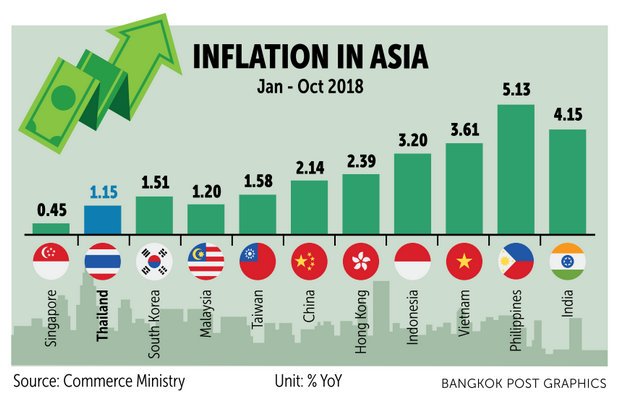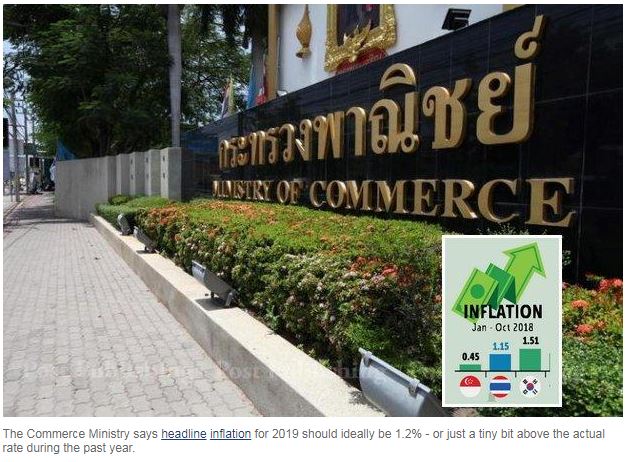Thailand: Headline rate for 2019 set at 0.7-1.7%
The Commerce Ministry has set the country’s headline inflation rate for 2019 at 0.7-1.7%, driven by higher energy and farm prices.
The Trade Policy and Strategy Office announced yesterday the 2019 inflation rate will be based on a median average of 1.2%.
The forecast was made assuming GDP growth of 3.5-4.5%, crude oil prices averaging US$70-80 per barrel, and an exchange rate of 32.5-33.5 baht per US dollar.
The office expects Thai exports to grow at 8% in 2019.
Pimchanok Vonkorpon, the office’s director-general, said the key factors are rising energy prices, crop prices and a higher projected interest rate, which would all affect inflation next year.
For 2018, the inflation rate stayed within 1.1-1.2%.
 The ministry reported the headline inflation rate, gauged by the increase in the consumer price index, rose for a 17th straight month in November year-on-year, but slowed for three consecutive months from September.
The ministry reported the headline inflation rate, gauged by the increase in the consumer price index, rose for a 17th straight month in November year-on-year, but slowed for three consecutive months from September.
The consumer prices rose 0.94% from November last year, marking the lowest point in eight months, after rising 1.23% year-on-year in October.
Ms Pimchanok said the fresh food prices, particularly for rice, livestock and processed food, increased from low-based prices last year.
Of the 422 product and service items used to gauge inflation, the prices of 222 items such as milled rice, kale, cooking gas, detergent, hot and cold coffee rose last month.
No price changes were registered for 83 items, while 117, including fresh poultry, toothpaste, white shrimp and oranges, saw prices drop.
On a monthly basis, prices were down 0.22% from October, driven by the reduction of oil prices and fresh vegetable and fruit prices from a supply glut.
For the first 11 months, inflation averaged 1.13% over the same period last year, which was still in line with the ministry’s forecast at 0.8-1.6%.
The core CPI, which excludes raw food and energy prices, rose 0.69% year–on–year in November and maintained at 0.0% month-on-month from October. For the first 11 months, core inflation averaged 0.71%.
“Should the country’s 2018 inflation reach 1.2%, it will be the highest rate in four years since 2014, when the inflation was at 1.89%,” Ms Pimchanok. “After that, the rate decreased 0.9% in 2015, rose slightly 0.19% in 2016, and increased 0.66% in 2017.”
Thanavath Phonvichai, vice-president for research at the University of the Thai Chamber of Commerce, said the headline inflation averaged 1%, reflecting a slowing in the economy.
“The rate has shown cloudy signs since the third quarter, and the government’s stimulus packages are needed to build up confidence to increase more spending in the future,” Mr Thanavath said.
Core inflation in November was unchanged, so there is no pressure for a central bank rate hike, he said.
Source: https://www.bangkokpost.com/business/news/1587062/headline-rate-for-2019-set-at-0-7-1-7-


 Thailand
Thailand




